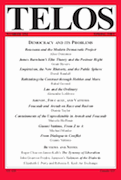Dianna Taylor ‘s “Countering Modernity: Foucault and Arendt on Race and Racism” appears in Telos 154 (Spring 2011). Read the full version at TELOS Online website.
 This article explores what the works of Michel Foucault and Hannah Arendt reveal about ways in which harm manifests itself within the context of modern societies, and about how the terrain of modernity might be negotiated such that harm is minimized and the practice of freedom is promoted. Focusing on the specific harm of racism, the article examines how Arendt’s account of the rise and function of Nazism in The Origins of Totalitarianism and Eichmann in Jerusalem reflects a concern with key aspects of the modern form of power that Foucault refers to as biopower. Two important points are derived from this analysis: First, Foucault and Arendt see racism, specifically as reflected in Nazism, as paradigmatic of the destructive potential of modernity. Second, Foucault’s and Arendt’s analyses of Nazi racism as a paradigmatic modern harm reflect a critical “counter-attitude” toward modernity. This counter-attitude provides valuable insight into the workings of and harms produced by modern power and thereby facilitates productive negotiation of the modern landscape.
This article explores what the works of Michel Foucault and Hannah Arendt reveal about ways in which harm manifests itself within the context of modern societies, and about how the terrain of modernity might be negotiated such that harm is minimized and the practice of freedom is promoted. Focusing on the specific harm of racism, the article examines how Arendt’s account of the rise and function of Nazism in The Origins of Totalitarianism and Eichmann in Jerusalem reflects a concern with key aspects of the modern form of power that Foucault refers to as biopower. Two important points are derived from this analysis: First, Foucault and Arendt see racism, specifically as reflected in Nazism, as paradigmatic of the destructive potential of modernity. Second, Foucault’s and Arendt’s analyses of Nazi racism as a paradigmatic modern harm reflect a critical “counter-attitude” toward modernity. This counter-attitude provides valuable insight into the workings of and harms produced by modern power and thereby facilitates productive negotiation of the modern landscape.







